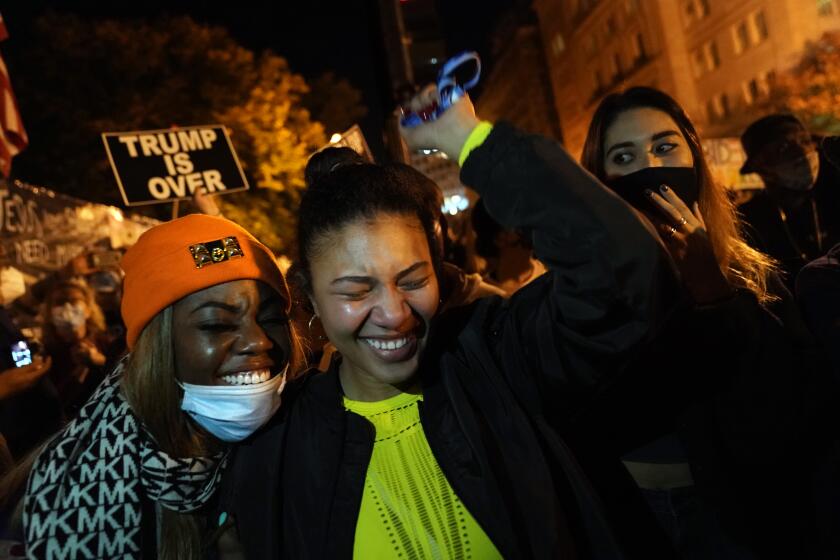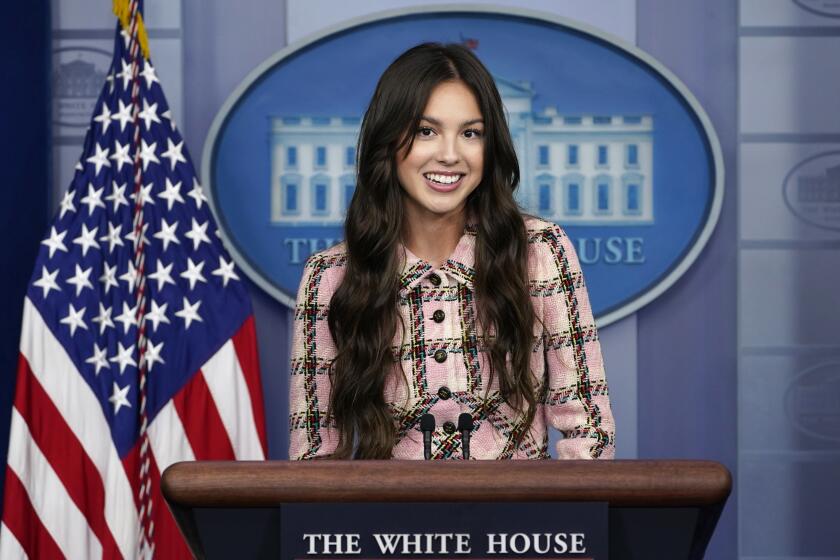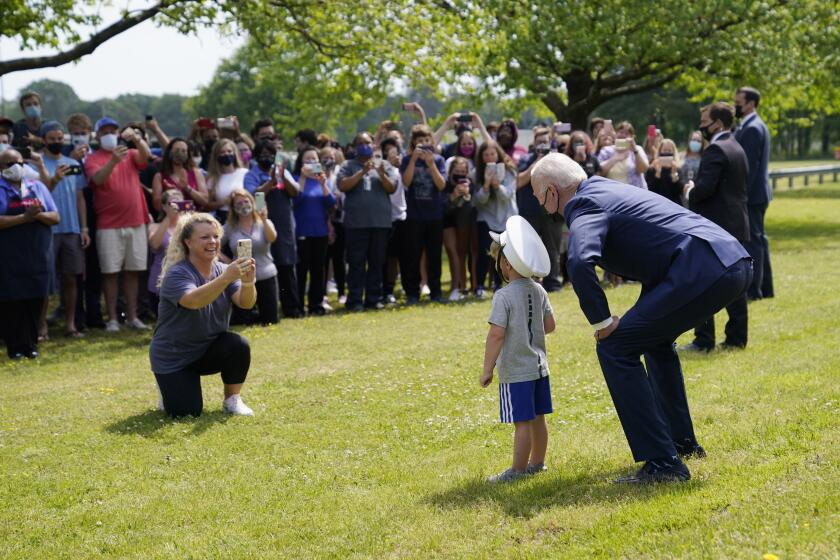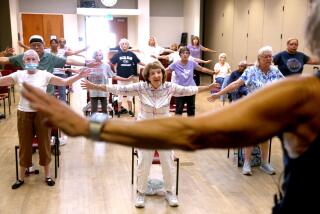Biden is the oldest president in American history. Here’s how he aims to bridge a canyon-sized generation gap
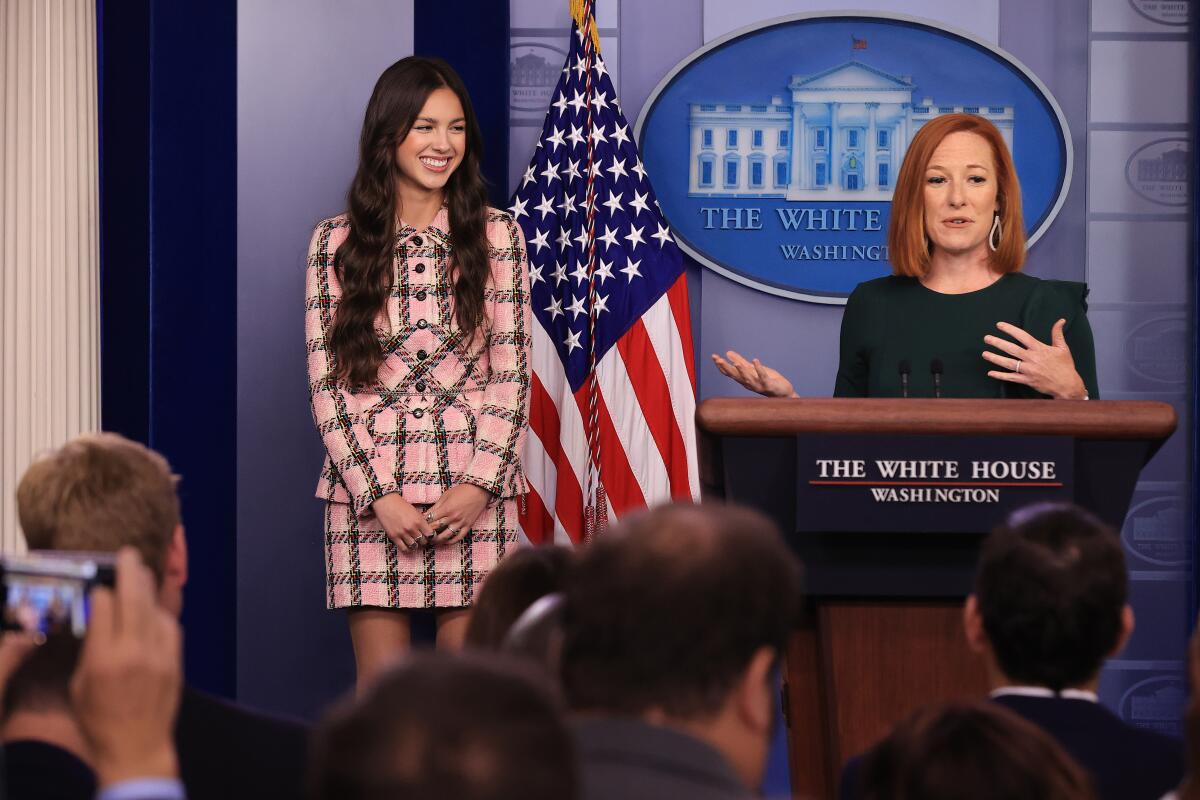
WASHINGTON — How does the oldest president in American history connect with voters who are 40, 50 or even 60 years younger than him? That’s the challenge facing President Biden, a 78-year-old politician who owes his election in part to a big spike in turnout among millennial and Gen Z voters.
His solution: Bring Gen Z celebrities into the White House. Include young people in advisory circles. Advocate policies to address millennials’ needs.
“We’ve seen some great signs from the administration about how seriously they do take the needs of young people,” said Sarah Audelo, executive director of the Alliance for Youth Action, a national network of grass-roots youth political groups.
But, she added, “there is still work to do.”
Audelo is worried that Democrats’ financial support for groups that helped mobilize young voters for Biden in 2020 is waning. Other youth advocates think Biden should be putting younger people in top White House ranks. They complain that he has not delivered on key campaign promises, including combating voter suppression and canceling student loan debt, and warn that it will be harder to keep young people engaged now that President Trump has receded from the scene.
“We’re excited to get Trump out of office, but we want more,” said Ashley Priore, a 21-year-old student at the University of Pittsburgh who has been lobbying for creation of an Office for Young Americans in the White House, to be directed by someone younger than 25.
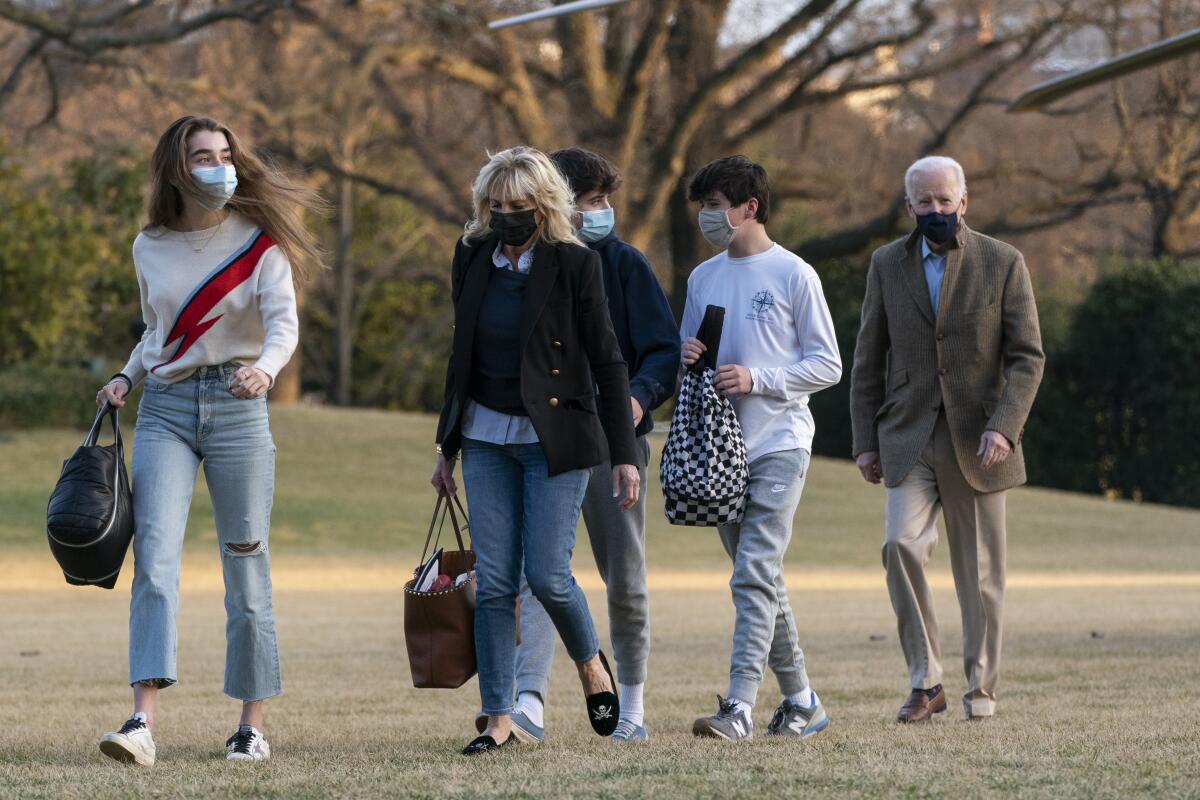
The average age of Biden’s initial Cabinet is 59 — on the high side but not out of line with recent presidents. A Brookings Institution analysis by Kathryn Dunn Tenpas found that the average age of initial Cabinets going back to the Reagan administration was over 52 — not surprising since Cabinet secretaries are typically seasoned professionals. Biden does have one millennial in the Cabinet — 39-year-old Transportation Secretary Pete Buttigieg — and others among top White House advisors. Symone Sanders, 31, who advised Bernie Sanders’ presidential campaign in 2016, is now a spokeswoman for Vice President Kamala Harris.
Of course, the age of a president — and his advisors — does not alone determine their ability to appeal to young people. Sanders, now 80, got much more support from under-30 voters in the 2020 Democratic presidential primary than did Buttigieg, the youngest candidate in the field.
But Biden has sometimes struggled to connect with young people who see him as a man of another era. During the campaign, the generation gap was laid bare when he drew complaints about his tendency to touch and hug people he meets in politics. He apologized, blaming the problem on changing “social norms.” During a 2020 campaign appearance on a radio show popular with young Black and Latino listeners, he said that “if you have a problem figuring out whether you’re for me or Trump, then you ain’t Black,” a remark that was especially insulting and tone-deaf to the young audience he was trying to win over.
The Power of Youth
This is the first of a three-part series on the effect of millennial and Generation Z voters on the Democratic Party, President Biden and the GOP.
Read the rest of the series:
Young voters turned out in force for Democrats in 2020. Will they stick around?
Sanders is also a man of another era, but much of his appeal comes from his passion and his progressive agenda, which spoke to a generation that is much more liberal than its elders. After Biden won the nomination, his approval ratings among young voters rose as his campaign stepped up outreach and he moved to the left, adopting some of Sanders’ policies during the general election.
One sign of how seriously Biden took young voters during the campaign: He hired pollster John Della Volpe, on leave from the Harvard Kennedy School’s Institute of Politics, specifically to advise the campaign on that slice of the electorate, then made him a regular part of the campaign’s senior advisory circle.
A diverse generation of young voters, who will be crucial in 2022, have been galvanized more by issues than candidates.
“The youth voice was represented at the highest level of the campaign on a regular basis,” said Della Volpe, who oversees a Harvard poll that has surveyed young voters twice a year since 2000 and is author of a forthcoming book, “FIGHT: How Gen Z is Channeling Their Fear and Passion to Save America.”
As president, Biden has taken steps to build and maintain connections with young people. He assigned Hannah Bristol, White House associate director of public engagement, to be point person for outreach to young voters.
Olivia Rodrigo, a Gen Z singer-songwriter, and Benny Drama, a 27-year-old comedian, were invited to the White House to help promote COVID-19 vaccinations among young people, though Biden took some flak for what critics saw as a highly contrived gesture. The White House has also worked quietly to stem the flow of anti-vaccine messages to youth: Officials reached out to rapper Nicki Minaj when she was spreading misinformation on Twitter, offering her the chance to talk to medical experts about the safety of the vaccine.
At an LGBTQ pride event in June, Biden was introduced by a 16-year-old Ashton Mota, a transgender high school student. This month, the White House convened student events to mark a week honoring historically Black colleges and universities. Other White House events have been held on issues of special concern to young people, such as higher education, climate change and gun safety.
Biden’s expanded tax credits to families with children have a been a big boon to millennials, many of whom are in their 30s and have kids. Those with preschoolers and younger children will also benefit from his proposed child-care program.
President Joe Biden invited ‘Drivers License’ hitmaker Olivia Rodrigo to the White House to help encourage her fellow youths to get vaccinated against COVID.
On one of the biggest issues facing millennials and Gen Zers — a mountain of student loan debt — Biden has extended a moratorium on student loan repayments that was first instituted under President Trump as an economic-relief measure during the COVID-19 pandemic. His administration has also provided debt relief to severely disabled borrowers and expanded relief for people who were defrauded by colleges.
But Biden has not yet made good on his campaign promise to cancel up to $10,000 in student loan debt for every borrower, let alone respond to demands for a broader debt cancellation plan like one advocated by Sanders.
On climate change policy, a top priority with young progressives, Biden has proposed more ambitious policies than any previous president. But it is still not enough to satisfy activists at the Sunrise Movement, a youth-led climate group that has staged many demonstrations to demand more aggressive steps to combat climate change.
Biden has seemed a changed man, calmer yet bolder. He savors the job, yet governs like a guy who knows the hurdles are high and time is short.
On another front, some activists and supporters are worried that Biden is not doing enough to reach out to Latino youth. Cecilia González Herrera, a 22-year-old Venezuelan refugee who appeared in a campaign video for Biden in 2020, says the biggest mistake Democrats have made has been to wait until six months before an election to communicate with Latinos and young people. She recorded a Spanish-language ad during the campaign calling out efforts to link Biden to socialism.
“I feel that the administration has been doing very well, but I feel like we’re lacking a little bit in connecting with Latinos,” said Herrera, who is working for Mi Vecino, a nonprofit group that is trying to register Latinos to vote in Florida.
Biden has not impressed former Sanders supporters like Evan Holt, a 33-year-old who is running for Cincinnati City Council. He voted for Biden but is disappointed in the president’s continuing opposition to marijuana legalization and in his handling of the U.S. withdrawal from Afghanistan.
But others who were “meh” on Biden during the campaign are happy with what they see in the White House.
“He was not my first choice,” said Molly Hays, a University of Virginia student from Alexandria. “But he’s been pushed to the left, which is good for me.”
More to Read
Get the L.A. Times Politics newsletter
Deeply reported insights into legislation, politics and policy from Sacramento, Washington and beyond. In your inbox three times per week.
You may occasionally receive promotional content from the Los Angeles Times.
